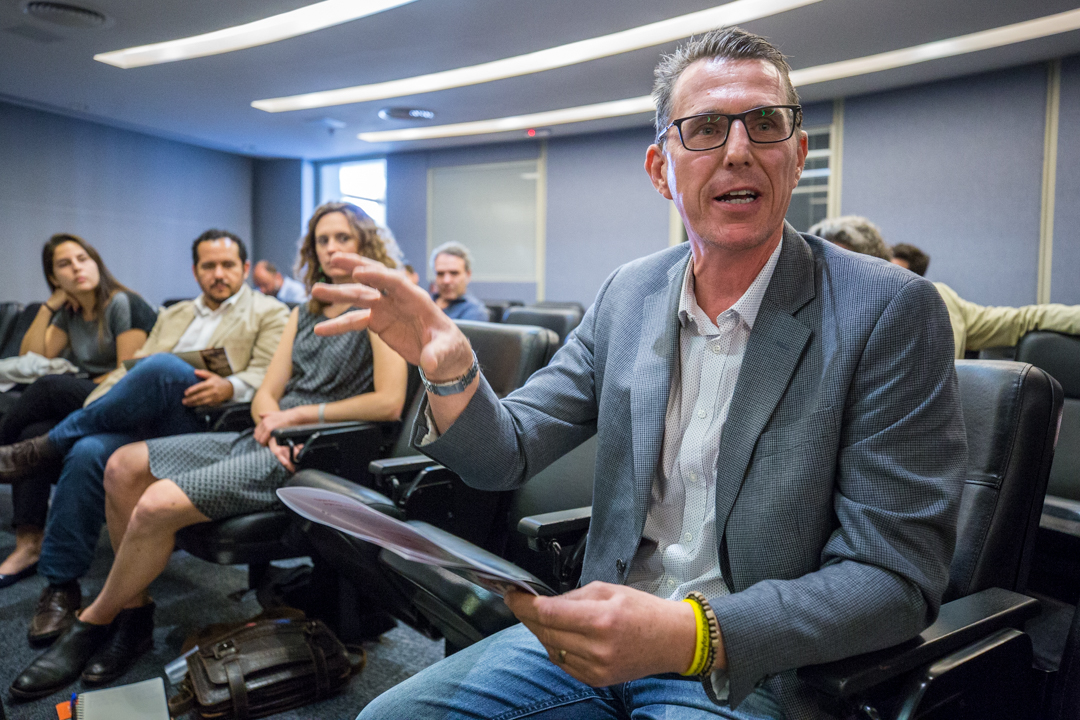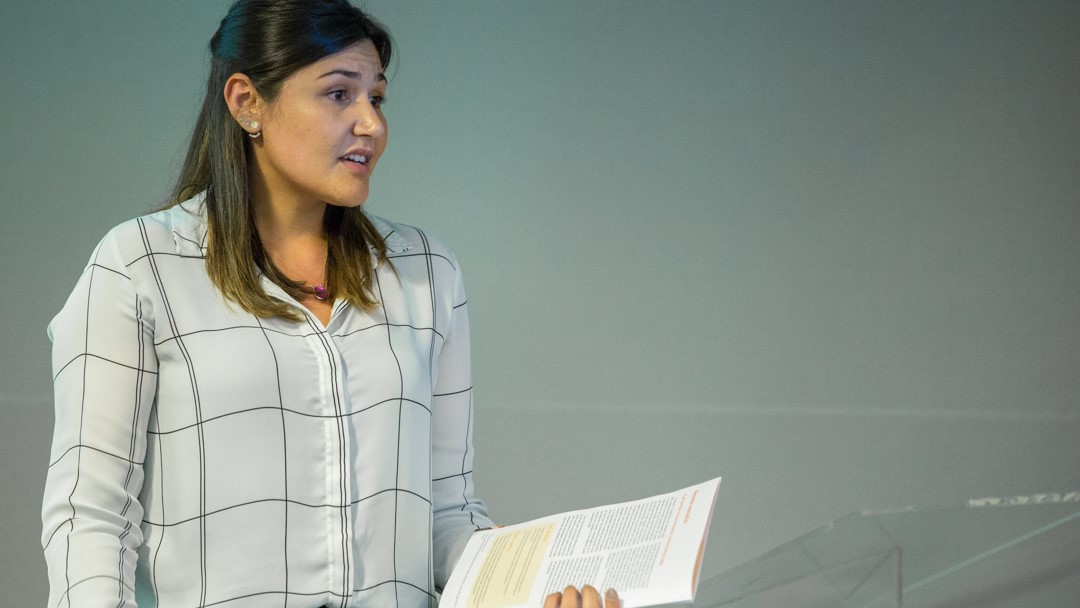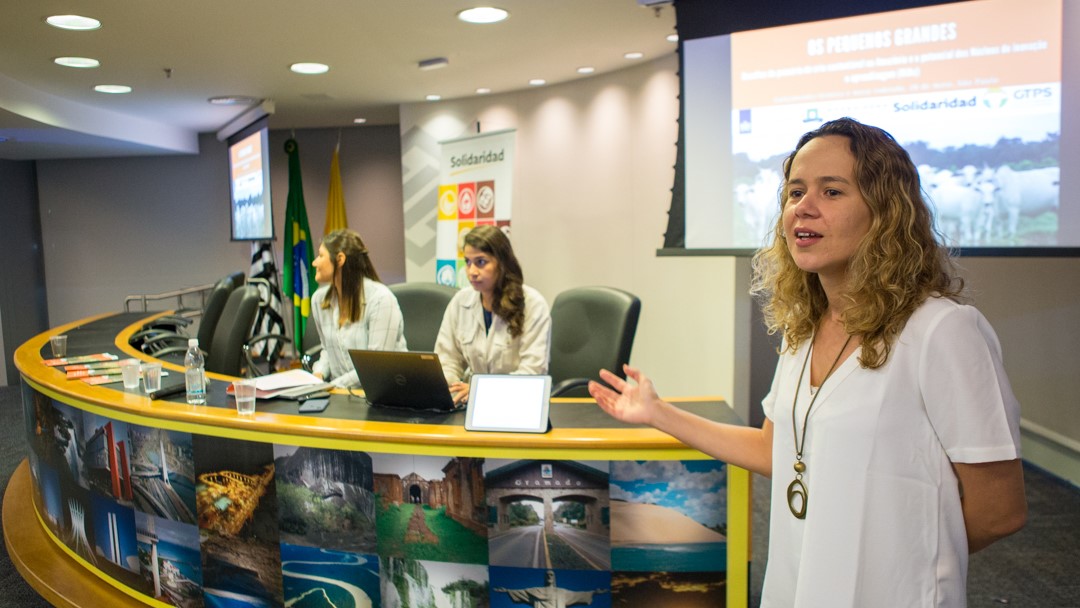Research carried out by Wageningen University, the Brazilian Roundtable for Sustainable Beef (GTPS), Embrapa and Solidaridad shows how livestock breeding in the Amazon region can bring economic and social advances, as well as reduce GHG emissions.

Improved farming practices and increased productivity among small-scale cattle ranchers in the Amazon can halt deforestation and reduce greenhouse gas (GHG) emissions in the atmosphere, thus contributing to Brazilian targets for global warming mitigation. This is the main conclusion from the study “Small scale, great opportunity: Towards sustainable young livestock farming in the Amazon and the potential of innovation and learning hubs (PDF)”, carried out by Solidaridad, Wageningen University and GTPS, in collaboration with Embrapa researchers. The research was presented on 28 May in São Paulo and on 30 May in Belém.
Livestock plays a leading role in the Amazon region since almost a third of the Brazilian cattle stock is in the region. Between 2003 and 2013, cattle heads increased by 200% in the biome. Preliminary data from the 2017 Agricultural Census, produced by the Brazilian Institute of Geography and Statistics (IBGE), showed that Pará state harbors the fifth largest cattle herd in the country, with almost 16 million heads of cattle. These are concentrated in the southeastern and southern regions of the state, with emphasis on the municipalities of São Félix do Xingu, Itupiranga, Novo Repartimento and Marabá.
Research methodology
The survey highlighted the fact that Brazil is the world’s leading exporter of meat, with 17% of the world market share, and that domestic production is only possible thanks to family farmers who hold 30% of the cattle heads. Based on Solidaridad experience in the Amazon, the study demonstrates the operational and technical feasibility of livestock breeding in the Amazonian biome – considered the invisible link of the value chain – and provides strategies to scale low carbon practices that are both profitable and socially inclusive.
Raquel Motta, a researcher at Wageningen University, explained how the study analyzed livestock breeding in southeastern Pará and identified economically viable, environmentally sustainable and socially inclusive experiences to intensify the activity in the region.
The concept of Innovation and Learning Hubs (ILHs) was, thus, created around three pillars of intervention:
- field actions, such as collective training and continual and integrated technical visits;
- digital platforms and apps such as Farming Solution and Extension Solution – created by Solidaridad to scale and boost the impact of technical assistance activities;
- and the strengthening of local institutional agreements.
“ILHs allow the model to gain scale, so that it can be discussed throughout the chain, analyzing the operational and financial viability of its implementation, in line with environmental and climatic requirements. If livestock raising increases its productivity, we can achieve industry goals, as well as other sectors. The union of efforts is one of the pillars of the methodology presented in the study,” said Motta. According to her, the Netherlands and other European countries are concerned about the origin of Brazilian meat and want to secure sustainable bases for its sourcing in order to break the stereotype of being produced at the expense of forests.

Solidaridad in Action
For Solidaridad Program Manager, Joyce Brandão, the study sheds light on the potential for GHG emissions mitigation and opportunities for small-scale calf producers, who have little access to knowledge, technical assistance and financing.
“We can not talk about zero-deforestation without improving agricultural practices. ILHs provide, in addition to access to management and production techniques, the opportunity to integrate small producers in the value chain. This can demonstrate their capacity to scale low-carbon policies, help Brazil achieve its mitigation goals and respond to today’s climate challenges,” she said. She also claims that this livestock model can reduce carbon emissions per kilogram of a calf by 75%, which correspond to a 43% reduction in GHG emissions per hectare per year.
Since 2015, Solidaridad carries the project “Inclusive and Sustainable Territories in the Amazon” in Novo Repartimento (PA). The project provides technical assistance to more than 150 small producers to recover degraded pastures areas, trains trainers and is testing agroforestry systems with low-carbon cocoa and animal husbandry. “Through ILHs, we aim to intensify livestock and expand cocoa production over recovered areas, generating more income and contributing to forest conservation,” said Joyce Brandão.
“The study is the result of a partnership that validated our integrated model under development in Pará and indicates ways to gain scale and positive impact. There are also intangible results, such as the permanence of new generations in the region, as new economic opportunities start to grow,” added Solidaridad Country Manager Rodrigo Castro.
During the launch in São Paulo, in the auditorium of the Bank of Brazil, a roundtable discussed the results of the study. Among its participants were Joyce Brandão, Raquel Motta, Executive Director of IDH in Brazil, Daniela Mariuzzo, Sustainability Director of JBS, Márcio Nappo, and Researcher at the Institute of Environmental Research of the Amazon (IPAM), Marcelo Stabile.
Support from the Netherlands and Pará
Sponsored by the Embassy of the Netherlands, the study brought together researchers, entrepreneurs, farmers, public authorities and members from the academia. Together, they discussed solutions for livestock production in Pará. The government authorities from Pará and the Netherlands stated their support to projects that guarantee sustainability, especially in terms of forest conservation and global warming effects mitigation. In 2015, at the Paris climate Summit, Brazil committed to reducing its emissions by 25% by 2025 compared to the 2005 indexes.
According to Pará’s Secretary of State for Environment and Sustainability, Mauro O ‘de Almeida, climate issues will remain on the public agenda. “It is a global agenda and we need to frame our livestock and agriculture within its context,” he said. Pará’s Secretary of Economic Development, Iran Lima, added: “We want to partner with several countries, but we want to access these markets through practices that preserve forests and improve the quality of life of Amazonian inhabitants”.
Advisor to the Netherlands Climate Ministry, Mirko de Ponti, noted that the Netherlands is seeking to increase the import of sustainable commodities based on the joint effort of the whole supply chain. “We want to invest in multilateral partnerships with governments, companies and civil society in the Amazon that contribute to the fight illegal deforestation.” The Netherlands Embassy Head of Economic Cluster in Brazi
l, Roderick Wols, referred to the legal framework: “We want to stimulate agribusiness productive chains that comply with environmental legislation. Partnering with several actors is what will generate the wealth we want,” he said.
Rodrigo Castro believes that the reflections made at the study launch events bring a new look at livestock raising in the Amazon. “Concrete alternatives have been presented for a productive chain with added value and social inclusion. So I can say that increasing the industry’s profitability and reducing emissions are already a new paradigm,” he said.
Please note, this publication is an executive summary meant to be accessible for a broad audience. If you are interested in learning more about the underlying research, please contact Joyce Brandao using the details below.

